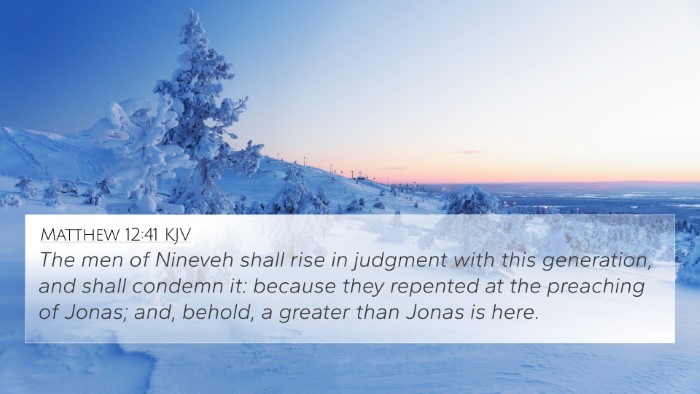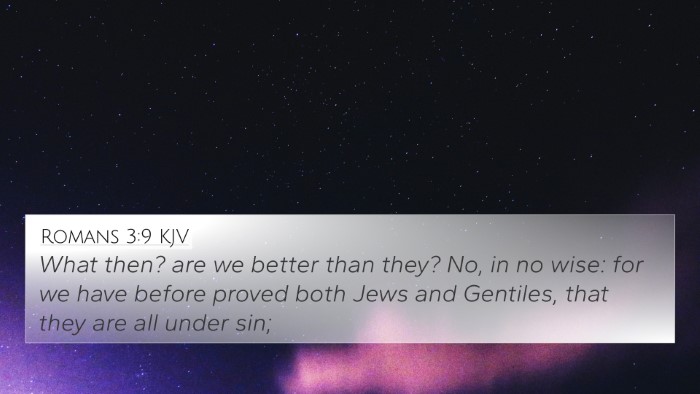Ezekiel 16:51 - Commentary and Meaning
Ezekiel 16:51 states: “Samaria hath not committed half of thy sins; but thou hast multiplied thine abominations more than they, and hast justified thy sisters in all thine abominations which thou hast done.” This verse presents a profound indictment of Jerusalem's unfaithfulness to God, using Samaria as a point of comparative reference.
Understanding the Context
The prophet Ezekiel is delivering a message of judgment against Jerusalem through a vivid and shameful portrayal of its moral degradation. By referencing Samaria, the capital of the northern kingdom of Israel, Ezekiel emphasizes the extent of Jerusalem's sins.
Interpretation of the Verse
- Moral Comparison: Matthew Henry notes that the sins of Jerusalem exceed those of Samaria. This comparison serves to demonstrate the depth of Judah's rebellion against God, as it had the benefit of the warnings and examples of its predecessors.
- Justification of Sins: Albert Barnes emphasizes that Jerusalem has justified the sins of others, showing a degree of moral perversion that implicitly advocates for wickedness rather than condemning it.
- Failure to Learn: Adam Clarke highlights that instead of learning from the failures of Samaria, Jerusalem has embraced and committed even greater abominations, showcasing a persistent obstinacy in sin.
Key Themes and Insights
This verse opens up several significant themes for deeper understanding and cross-referencing within the Bible:
- Judgment and Mercy: The contrast between Yahweh's judgment and the mercy extended to His people is a recurrent theme. Samaria's past serves as a precursor and warning for Jerusalem.
- Repentance and Restoration: The call for Israel and Judah to acknowledge and repent from their sinful ways is essential, which links to themes seen throughout the prophetic books.
- Identity and Accountability: Jerusalem’s identity as God's chosen people brings with it a greater level of accountability, which is reflected upon throughout scriptural texts.
Bible Verse Cross-References
Understanding Ezekiel 16:51 benefits from examining related scripture passages that provide additional insights into God's message of judgment and accountability:
- Isaiah 3:9 - Here, Jerusalem's rebellion is pointed out, revealing the visible nature of its sin.
- Lamentations 1:8 - The acknowledgment of Jerusalem's sins provides context for its suffering and loss.
- Ezekiel 23:4 - This passage uses similar language to describe the unfaithfulness of Samaria and Jerusalem, drawing parallels between them.
- Jeremiah 3:6 - The Lord speaks about Israel’s infidelity, serving as a backdrop that aids in understanding the scope of Jerusalem's sins.
- Hosea 6:10 - The theme of treachery in Israel highlights the significance of recognizing sin and its consequences.
- Matthew 11:21 - Jesus speaks about Chorazin and Bethsaida, linking that cities' sins to those historical judgments against Israel.
- Revelation 3:17-19 - This passage serves as a warning to the church, paralleling Jerusalem’s condition today, urging repentance from spiritual complacency.
Applying the Insights
When examining this verse in conjunction with its cross-references, believers can gain a profound understanding of their own spiritual state. It's essential to recognize that:
- Historical Context: Understanding the historical context of Israel and Judah’s transgressions allows contemporary readers to see the timeless nature of God's call to righteousness.
- Moral Relevance: The moral failures observed are not merely historical; they resonate within today's community believers, making this verse applicable to personal reflection and communal accountability.
- Spiritual Growth: By engaging with these scriptures, individuals can delve into personal growth, learning from past mistakes as presented in the biblical narrative.
Conclusion
In summary, Ezekiel 16:51 serves as a sobering reminder of the perils of turning away from God. Its rich layers of meaning, rooted in the failures of both ancient Israel and Jerusalem, invite believers to reflect on their own faithfulness and the nature of their relationship with God. As we see through the cross-referenced verses, God’s desire for repentance and restoration remains a central theme throughout scripture, urging all to seek holiness and humility before Him.
Further Study Tools
For those interested in a more comprehensive study of cross-referencing in the Bible, several tools can enhance your understanding:
- Bible Concordance: A crucial tool for finding related verses and themes.
- Bible Cross-Reference Guide: Utilizes structural analysis to show connections across different scriptures.
- Comprehensive Bible Cross-Reference Materials: Include charts and guides that provide visual representations of thematic links.
- How to use Bible Cross-References: Learning methods to connect passages allows for deeper theological insights.






